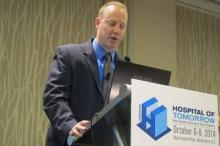WASHINGTON – The accountable care organizations that are participating in Medicare’s highest risk, highest reward program improved in both quality of care and controlling costs in the second year, according to new government figures.
Even so, groups continue to leave the Pioneer ACO program. In the first year, 2012, there were 32 ACOs agreeing to share a high proportion of savings – or take on a high proportion of losses – as part of the Pioneer ACO program; 23 participated in 2013. Currently, 19 ACOs are participating, according to the Centers for Medicare & Medicaid Services.
Dr. Patrick Conway, CMS chief medical officer and deputy administrator for innovation and quality, said that drop outs were expected.
“We purposely set up the Pioneer program and our ACO program so that ACOs could migrate risk tracks,” Dr. Conway said at the meeting. “We actually predicted at this point we would have less Pioneer ACOs than we have now,” he said.
CMS would like to see every ACO stay in the Pioneer program, he said, adding, “but the reality is we set up the policy construct to allow flexibility of risk tracks.”
Dr. Conway noted that there are still some 600,000 Medicare beneficiaries who receive care through ACOs in the Pioneer program.
Overall, the 23 ACOs that participated in both 2012 and 2013 saved $90 million for 2013; they saved $128 million in 2012.
Not surprisingly, many hospitals that lost money in the first year did not participate in the second year, according to the CMS data. But some did, despite continued losses.
At least half of the Pioneers shared in savings, said Dr. Conway.
Beth Israel Deaconess Care Organization appeared to be a fairly big winner, generating $17.6 million in savings, and getting to keep some $10.6 million.
The San Francisco-based Brown & Toland Physicians’ ACO generated $4.5 million in savings, keeping almost $2.5 million. The Mount Auburn Cambridge Independent Practice Association, in the Boston area, kept $2.2 million of the $3.6 million it generated for Medicare.
Pioneers that created savings in the first 2 years are eligible to start receiving a per member per month prospective payment in 2014 if they are still participating.
The CMS has not yet released data on how many Pioneer ACOs are operating under that payment arrangement.
The Pioneer ACOs also improved quality of care, with mean performance scores for the group rising from 71% to 84%, said Dr. Conway. The Pioneers improved in 28 of the 33 goals measured.
He said he was particularly impressed with the overall improvement in six out of the seven measures of patient experience.
Patients reported on whether they received timely appointments, had good access to specialists, how well the physician communicated, and if there was shared decision making, among other measures.
Going forward, the CMS is considering removing some process measures and adding more outcome measures, said Dr. Conway.
On Twitter @aliciaault


